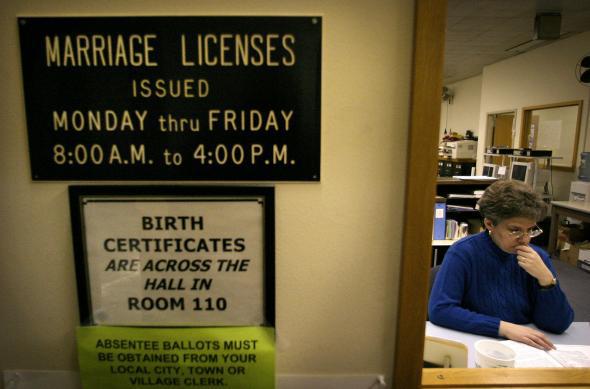On Friday afternoon (obviously), U.S. District Judge Barbara Crabb struck down Wisconsin’s gay marriage ban, holding that it violates both the due process and equal protection clauses of the federal constitution. Crabb’s ruling is light on the strikingly eloquent rhetoric that so many other judges have employed in such cases, though she does neatly summarize the stakes of the issue at the outset:
This case is not about whether marriages between same-sex couples are consistent or inconsistent with the teachings of a particular religion, whether such marriages are moral or immoral or whether they are something that should be encouraged or discouraged. It is not even about whether the plaintiffs in this case are as capable as opposite-sex couples of maintaining a committed and loving relationship or raising a family together. Quite simply, this case is about liberty and equality, the two cornerstones of the rights protected by the United States Constitution.
As that last line suggests, Crabb presents two unique but interlocking rationales for invalidating Wisconsin’s ban—both drawn from the Fourteenth Amendment and built upon the Supreme Court’s recent ruling in United States v. Windsor. First, she holds that, since marriage has long been a fundamental right, the due process clause grants gay people the liberty to choose their own spouses. Second, Crabb rules that same-sex marriage bans openly discriminate on the basis of sexual orientation, a clear violation of the equal protection clause. She even applies heightened scrutiny to laws that target gay people, meaning the government has to prove an important government interest is at stake. Since Wisconsin could not seriously argue that it had an important interest in keeping gay people from getting married, its efforts to defend the ban were probably doomed from the start.
Wisconsin’s ban, however, isn’t quite dead yet. Although the judge didn’t stay her ruling—meaning marriages can, in theory, start immediately—she invited both parties to brief her on the issue. State Attorney General J.B. Van Hollen has stated that he’ll continue to defend the law, increasing the likelihood that the ruling will be stayed pending appeal. That would halt gay marriages for the time being—but given the ineluctable tilt toward equality we’re seeing around the country, there’s really little doubt that, in the long run, Wisconsin’s ban will remain in its proper place: the ash heap of history.
